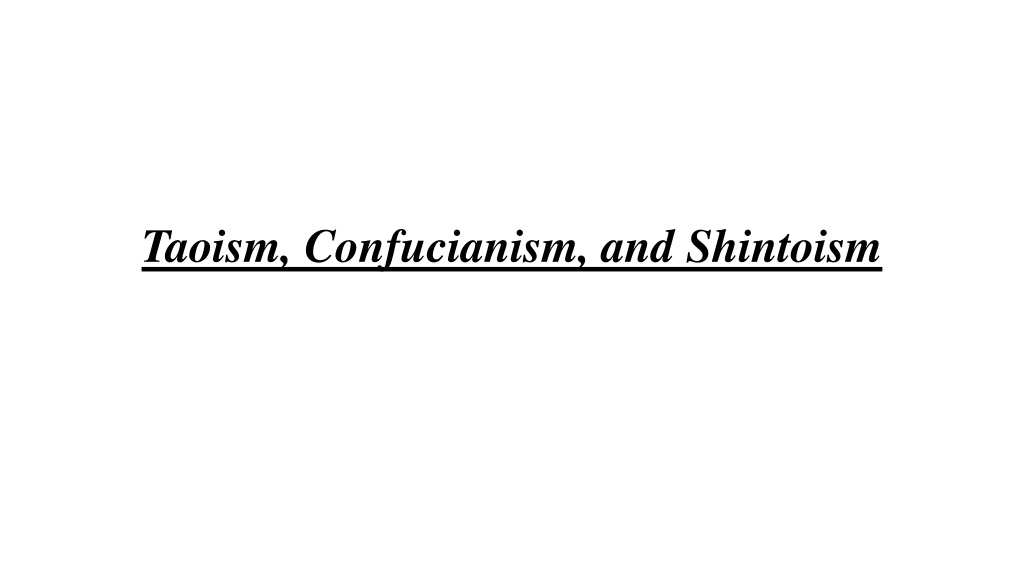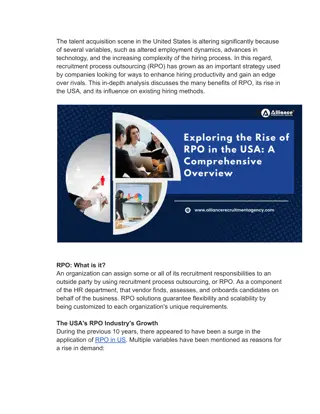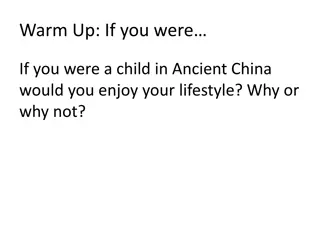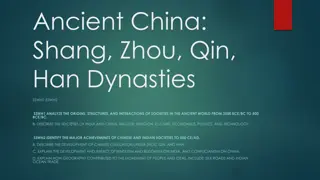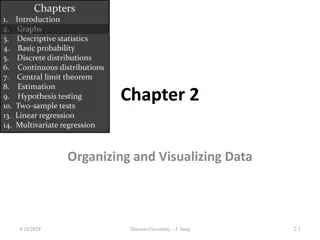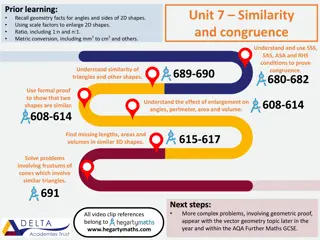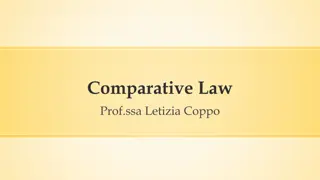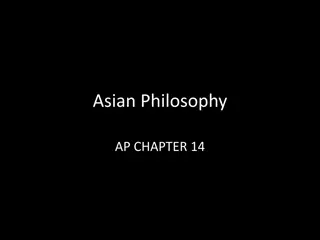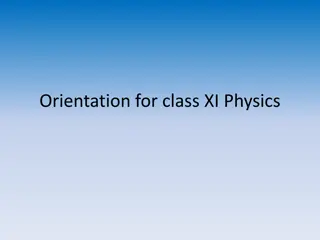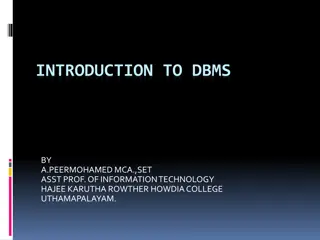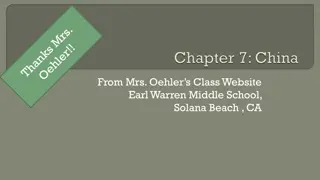Understanding Confucianism: A Comprehensive Overview
Confucianism is a multifaceted tradition that encompasses elements of philosophy, religion, governance, and way of life. Originating from the teachings of Confucius, it emphasizes the sacred nature of human relationships, moral values, and respect for the spiritual realm. The Five Classics play a significant role in shaping the Confucian vision by addressing ethical foundations, societal structures, and historical events. Dive into the profound wisdom of Confucianism to explore its enduring influence on Chinese culture and civilization.
Download Presentation

Please find below an Image/Link to download the presentation.
The content on the website is provided AS IS for your information and personal use only. It may not be sold, licensed, or shared on other websites without obtaining consent from the author. Download presentation by click this link. If you encounter any issues during the download, it is possible that the publisher has removed the file from their server.
E N D
Presentation Transcript
Basic Description a tradition, a philosophy, a religion, a humanistic or rationalistic religion, a way of governing, or simply a way of life. Confucianism developed from what was later called the Hundred Schools of Thought from the teachings of the Chinese philosopher Confucius (551 479 BCE), who considered himself a re- codifier and re-transmitter of the theology and values inherited from the Shang (c. 1600 BCE 1046 BCE) and Zhou dynasties(c. 1046 BCE 256 BCE). In the Han dynasty (206 BCE 220 CE), Confucian approaches edged out the "proto-Taoist" Huang Lao as the official ideology, while the emperors mixed both with the realist techniques of Legalism.
Basic Description (continued) Confucianism transcends the dichotomy between religion and humanism, considering the ordinary activities of human life and especially human relationships as a manifestation of the sacred, because they are the expression of humanity's moral nature (x ng ), which has a transcendent anchorage in Heaven (Ti n ) and unfolds through an appropriate respect for the spirits or gods (sh n) of the world
, Wjng) and the Confucian vision Five Classics ( I Ching or Classic of Change or Book of Changes, generally held to be the earliest of the classics, shows a metaphysical vision which combines divinatory art with numerological technique and ethical insight; philosophy of change sees cosmos as interaction between the two energies yin and yang; universe always shows organismic unity and dynamism. Classic of Poetry or Book of Songs is the earliest anthology of Chinese poems and songs. It shows the poetic vision in the belief that poetry and music convey common human feelings and mutual responsiveness. Book of Documents or Book of History is a compilation of speeches of major figures and records of events in ancient times embodies the political vision and addresses the kingly way in terms of the ethical foundation for humane government. The documents show the sagacity, filial piety, and work ethic of Yao, Shun, and Yu. They established a political culture which was based on responsibility and trust. Their virtue formed a covenant of social harmony which did not depend on punishment or coercion. Book of Rites describes the social forms, administration, and ceremonial rites of the Zhou Dynasty. This social vision defined society not as an adversarial system based on contractual relations but as a community of trust based on social responsibility. The four functional occupations are cooperative (farmer, scholar, artisan, merchant). Spring and Autumn Annals chronicles the period to which it gives its name, Spring and Autumn period (771 476 BCE) and these events emphasize the significance of collective memory for communal self-identification, for reanimating the old is the best way to attain the new.
Theory and Theology Confucianism revolves around the pursuit of the unity of the individual self and the God of Heaven (Ti n ), or, otherwise said, around the relationship between humanity and Heaven. The principle of Heaven (L or D o ), is the order of the creation and the source of divine authority, monistic in its structure. Individuals may realize their humanity and become one with Heaven through the contemplation of such order. This transformation of the self may be extended to the family and society to create a harmonious fiduciary community. Confucianism conciliates both the inner and outer polarities of spiritual cultivation, that is to say self-cultivation and world redemption, synthesized in the ideal of "sageliness within and kingliness without". R n, translated as "humaneness" or the essence proper of a human being, is the character of compassionate mind; it is the virtue endowed by Heaven and at the same time the means by which man may achieve oneness with Heaven comprehending his own origin in Heaven and therefore divine essence. In the D t ng sh ( / ) it is defined as "to form one body with all things" and "when the self and others are not separated ... compassion is aroused".
Tin and the Gods Ti n ( ), a key concept in Chinese thought, refers to the God of Heaven, the northern culmen of the skies and its spinning stars, earthly nature and its laws which come from Heaven, to "Heaven and Earth" (that is, "all things"), and to the awe-inspiring forces beyond human control. There are such a number of uses in Chinese thought that it is not possible to give one translation into English. Regarding personal gods (sh n, energies who emanate from and reproduce the Tian) enliving nature, in the Analects, Confucius says that it is appropriate ( / y ) for people to worship ( j ng) them, though through proper rites ( / l ), implying respect of positions and discretion. Confucius himself was a ritual and sacrificial master. Answering to a disciple who asked whether it is better to sacrifice to the god of the stove or to the god of the family (a popular saying), in 3.13 Confucius says that in order to appropriately pray gods one should first know and respect Heaven. In 3.12 he explains that religious rituals produce meaningful experiences, and one has to offer sacrifices in person, acting in presence, otherwise "it is the same as not having sacrificed at all". Rites and sacrifices to the gods have an ethical importance: they generate good life, because taking part in them leads to the overcoming of the self.Analects 10.11 tells that Confucius always took a small part of his food and placed it on the sacrificial bowls as an offering to his ancestors.
Social Morality and Ethics Confucian ethical codes are described as humanistic. They may be practiced by all the members of a society. Confucian ethics is characterized by the promotion of virtues, encompassed by the Five Constants, W ch ng ( ) in Chinese, elaborated by Confucian scholars out of the inherited tradition during the Han dynasty. The Five Constants are: R n ( , benevolence, humaneness); Y ( / , righteousness or justice); L ( / , proper rite); Zh ( , knowledge); X n ( , integrity). These are accompanied by the classical S z ( ), that singles out four virtues, one of which is included among the Five Constants: Zh ng ( , loyalty); Xi o ( , filial piety); Ji ( / , contingency); Y ( / , righteousness). There are still many other elements, such as ch ng ( / , honesty), sh ( , kindness and forgiveness), li n ( , honesty and cleanness), ch ( / , shame, judge and sense of right and wrong), y ng ( , bravery), w n ( / , kind and gentle), li ng ( , good, kindhearted), g ng ( , respectful, reverent), ji n ( / , frugal), r ng ( / , modestly, self-effacing).
History of Confucianism Confucianism may be identified as a continuation of the Shang-Zhou (~1600 BCE 256 BCE) official religion, or the Chinese aboriginal religion which has lasted uninterrupted for three thousand years. Both the dynasties worshipped the supreme godhead, called Shangdi ( "Highest Deity") or simply D ( ) by the Shang and Tian ( "Heaven") by the Zhou. Shangdi was conceived as the first ancestor of the Shang royal house, an alternate name for him being the "Supreme Progenitor" ( Sh ngji ). In Shang theology, the multiplicity of gods of nature and ancestors were viewed as parts of Di, and the four f ng ("directions" or "sides") and their f ng ("winds") as his cosmic will. With the Zhou dynasty, which overthrew the Shang, the name for the supreme godhead became Tian ( "Heaven"). While the Shang identified Shangdi as their ancestor-god to assert their claim to power by divine right, the Zhou transformed this claim into a legitimacy based on moral power, the Mandate of Heaven. In Zhou theology, Tian had no singular earthly progeny, but bestowed divine favor on virtuous rulers. Zhou kings declared that their victory over the Shang was because they were virtuous and loved their people, while the Shang were tyrants and thus were deprived of power by Tian.
History of Confucianism (continued) Confucius (551 479 BCE) appeared in this period of political decadence and spiritual questioning. He was educated in Shang-Zhou theology, which he contributed to transmit and reformulate giving centrality to self-cultivation and agency of humans, and the educational power of the self-established individual in assisting others to establish themselves (the principle of ir n, "loving others").As the Zhou reign collapsed, traditional values were abandoned resulting in a period of moral decline. Confucius saw an opportunity to reinforce values of compassion and tradition into society. Disillusioned with the widespread vulgarization of the rituals to access Tian, he began to preach an ethical interpretation of traditional Zhou religion. In his view, the power of Tian is immanent, and responds positively to the sincere heart driven by humaneness and rightness, decency and altruism. Confucius conceived these qualities as the foundation needed to restore socio-political harmony. Like many contemporaries, Confucius saw ritual practices as efficacious ways to access Tian, but he thought that the crucial knot was the state of meditation that participants enter prior to engage in the ritual acts. Confucius amended and re-codified the classical books inherited from the Xia-Shang-Zhou dynasties, and composed the Spring and Autumn Annals.
